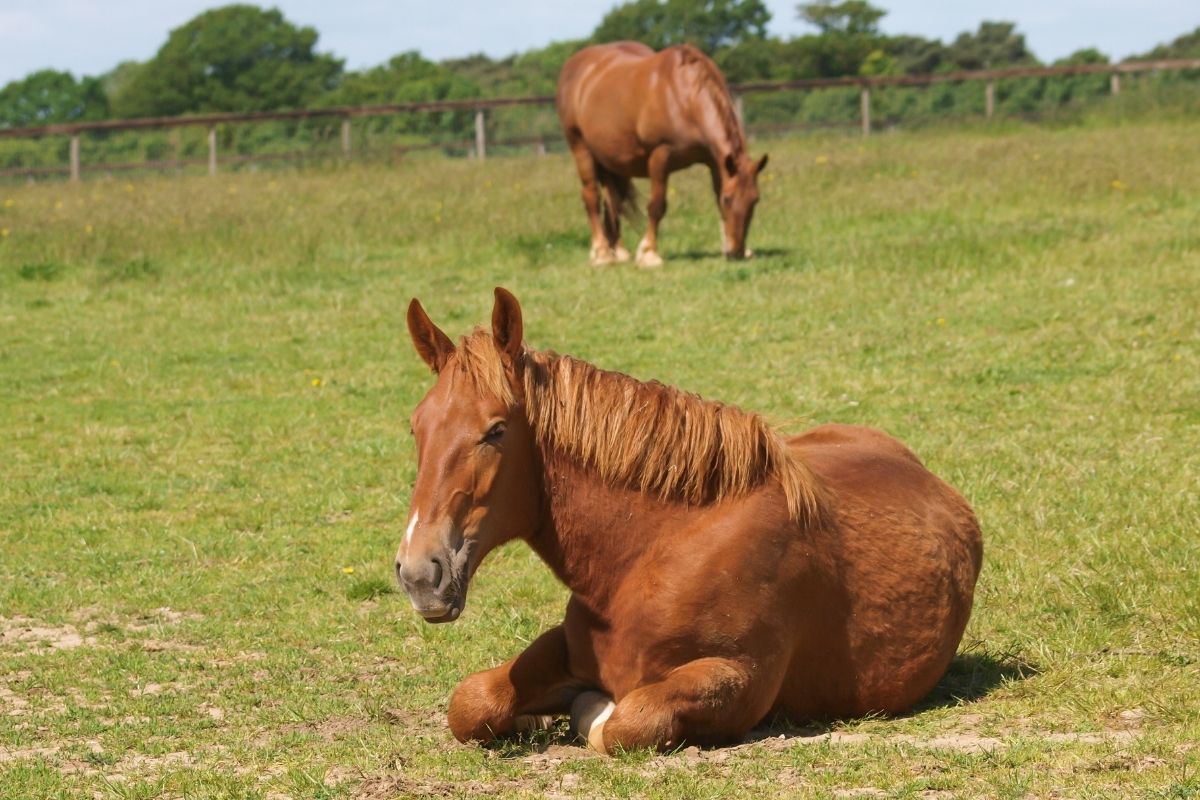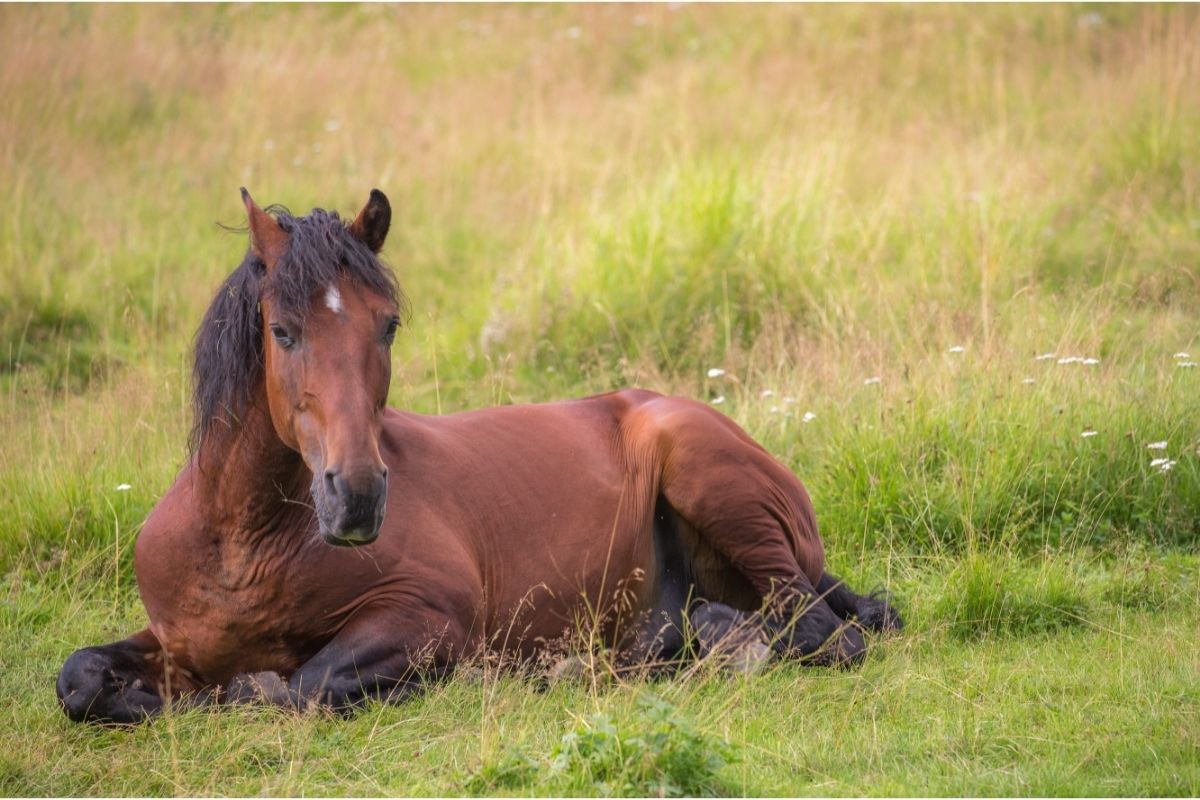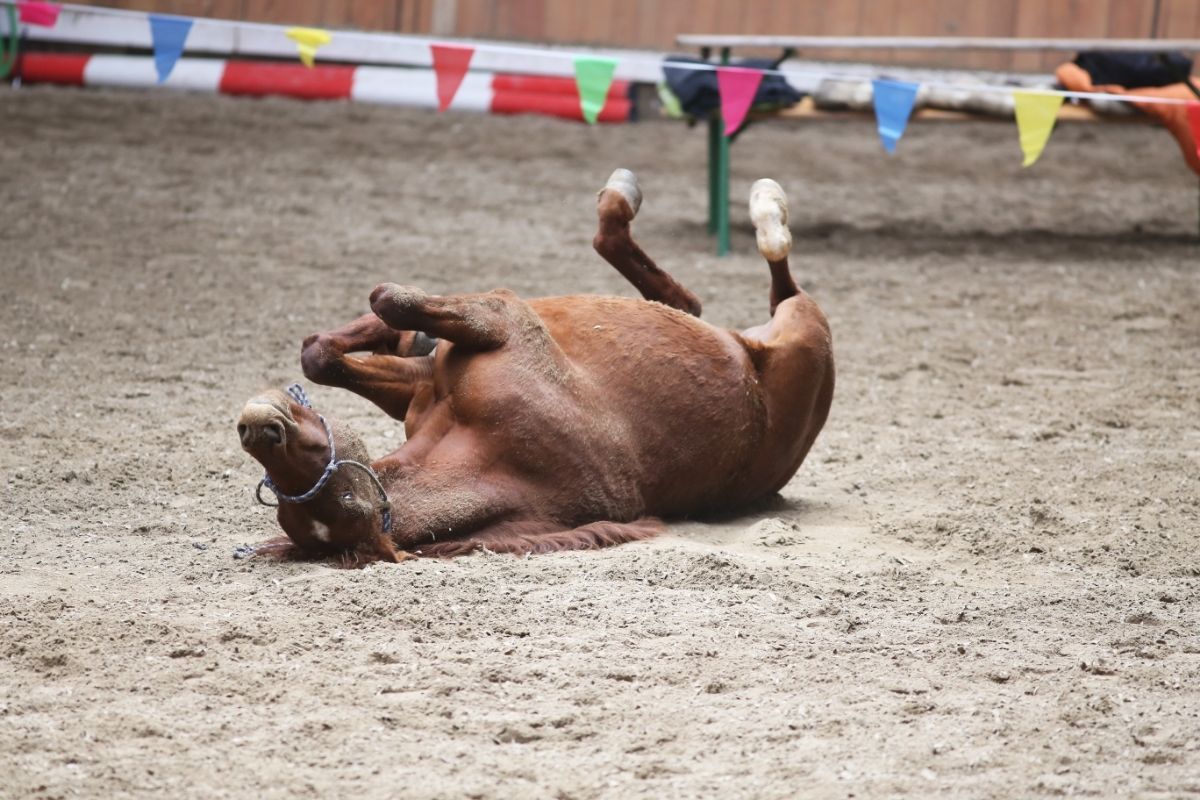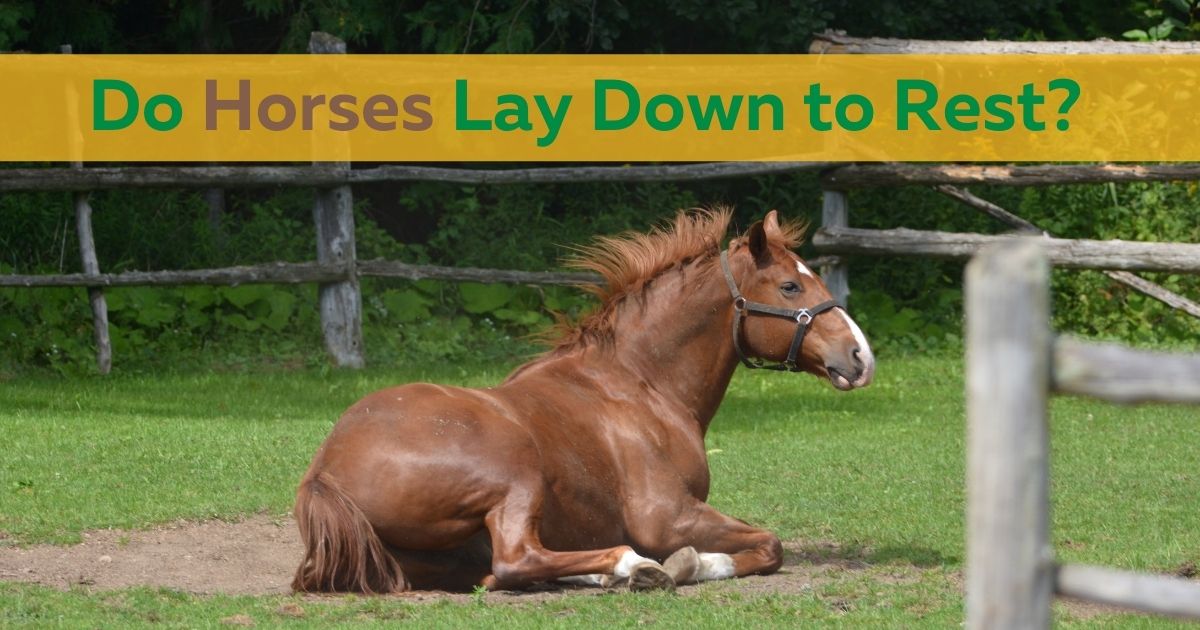Horses have unique abilities. But, do horses lay down? Yes, they do so to obtain sufficient sleep. Therefore, it is essential to know how your horse sleeps as a sign that you mind its welfare.
Do you also know that horses run fast to flee from predators but not compete? That is a bonus fact that you should know about your horse. But do horses lay down to sleep? Let us get deeper on sleeping horses.
How do Horses Sleep?
You might be asking how often do horses lay down. Your horse is a polyphasic sleeper. So, it can sleep several times a day. You can find it sleeping upright or flat on its side. Also, your horse does not have a constant sleeping pattern. Additionally, a foal lays down differently than an adult horse.
Your horse has a stay apparatus in the hind and front limbs. The feature helps it to sleep while standing. The legs tend to lock in place when a horse sleeps upright. You can also observe such behavior in other large animals, including cows and elephants.
Do you know why horses sleep standing up? If you do not know, let us discuss it. Before the domestication of horses, they used to live in plains. They were also a target for several predators. So, they needed to stay alert to escape whenever a danger arose. Sleeping upright was a way of staying alert to survive.
A horse lays down to sleep deeply. It gets into a Rapid Eye Movement sleep (REM sleep) that forces it to lay down and rest. When a horse is in REM sleep, its brain activity increases, and its muscle tone decreases. Low muscle tone compels a horse to lay down or lean heavily on something.
REM sleep contributes to the development of the nervous system of a horse. It also creates new memories and the ability to learn well. However, various studies indicate that a horse can reduce its learning capability when you keep waking it up during its REM sleep.
When a horse sleeps deeply, its brain transfers acquired lessons from short-term memory to long-term memory. So, a horse tends to remember more lessons after sleeping deeply. However, lack of deep sleep causes a change in the central nervous system and neurotransmitters. The changes hurt the memory, ability to learn, and overall wellbeing of a horse.
A horse can only doze while standing, given that it has to lay down to get deep sleep. So the sleep of a standing horse equates to the one you get when you take a quick nap on a sofa.
If your horse does not lay down to sleep, it can suffer from sleep deprivation. The situation makes a horse very drowsy. Afterward, it can collapse and then rise suddenly. If you notice trauma on the ankles and knees of your horse, it is not having sufficient sleep. The trauma comes from musculoskeletal pain because of getting down and up several times.
Lack of sleep among horses has a series of detrimental effects. To begin with, a sleep-deprived horse can become weak. It also experiences difficulties in controlling its body temperature. Last, its metabolism rate increases, and it eats more but does not gain weight. Read our article and find out the 6 Best Weight Gain Supplements for Horses.

How Long do Horses Sleep?
An adult horse’s daily sleep is one to three hours. Its REM sleep takes about an hour out of the total sleeping time. If your horse sleeps longer, it is a sign of physical abnormality, including colic and musculoskeletal pain.
Every horse has a timed sleeping cycle. After lying down for five to ten minutes, it gets into REM sleep. Afterward, the horse gets into a light rest for another five minutes. Last, it stands up to have another five minutes of shallow sleep. A horse repeats the cycle after every 45 minutes in its total sleeping time.
Regarding foals, they sleep for almost half a day until they become over three months old. In other words, they can sleep for up to six hours. Their sleep pattern changes as they grow up. After three months, they take fewer naps. Also, they prefer sleeping while standing.
Always watch the sleeping patterns of your horse. The move helps to notice sleep deprivation or excessive sleeping. So, if you suspect abnormal sleeping behavior on your horse, set a video recorder to capture its sleeping patterns.
You should also ensure that the box where your horse stays is large enough for your horse to move around freely. Horses under training spend almost 23 hours in a stable. For this reason, ensure that you equip the stable with proper facilities that will improve the comfort of such a horse.
According to a past research study, horses that stay in small boxes experience sleeping difficulties. Such horses cannot lay well in small containers. Also, keeping two horses in a box is detrimental to their sleeping pattern. One horse may be an aggressive feeder, and it can interrupt the REM sleep of the other horse.
Other elements that can affect the sleeping pattern of your horse include feeding habits, transportation, stall vs. turnout, and environment familiarity.
Overall, you should provide an almost-natural environment for your horse. Such an environment improves the overall wellbeing of your horse. In return, your horse will perform optimally in its intended activities. Remember, your horse will remain loyal to you into an unforeseeable future. So, give it the best living and sleeping quarters.
Do Horses Lay Down to Rest?
It is possible to find your horse lying down to rest besides catching its REM sleep. Sometimes, horses lay down to enjoy the sunshine. They also lay down to relax in a comfortable environment. However, horses rest only for a short time.
A horse cannot spring back on its feet quickly when in a lying position. The inability makes a horse vulnerable to predators, especially the wild horses. That is one of the reasons why it spends a lot of time standing. Also, a horse cannot lay down unless it feels secure, safe, and comfortable.
If you see wild horses in a herd, it is their protection measure. They do not stay together because they are social animals.
Also, all wild horses in a herd do not sleep. Instead, some stay awake to warn the rest about any imminent danger of predators. The coming together of wild horses allows them to sleep deeply because the guard horses are always watching out for any canines.

The Three Legs on, One Leg Off Concept
It is also interesting to learn how the legs of a horse function when it is standing. The leg muscles, tendons, and ligaments of a horse have a special arrangement that locks the major joints of the legs. The arrangement makes up the stay apparatus that helps a sleeping horse not fall off while sleeping in a standing position.
The stay apparatus also helps a horse rest one leg and support itself with the other three legs. Also, a horse rests each leg at a time. Given that a horse can weigh up to 500 pounds (225 kilograms), its legs require a rest after supporting such weight.
When do Horses Lie Down?
Horses lie down for three primary reasons: To sleep deeply, when they are sick, and when relaxing. Let us explore in-depth each reason that keeps your horse lying down:
Horses Lie Down to Sleep Deeply
Your horse gets into a deep sleep in two stages. The first stage is slow-wave sleep. During this stage, a horse starts sleeping while standing up. It is a shallow stage of rest. If a horse is in the first wave of sleeping, it lowers its head. Its lower lip also relaxes, and its eyes show few movements. Last, its eyelids are partially closed.
Horses usually relax one of their hind legs during their first stage of sleep. They also engage their stay apparatus, which makes them conserve energy and doze off in an upright position. Eighty-five percent of a horse’s rest is during the first stage.
The second stage of a horse’s sleep is paradoxical or REM sleep. During this stage, the eyes of a horse are closed, and they move randomly in different directions. Also, their neck muscles tend to relax. Last, horses have to lie to get into paradoxical sleep.
If the environment is safe and comfortable, a horse can transit from slow-wave sleep to paradoxical sleep without a break. However, pasture horses have to wake up a couple of times before getting into a paradoxical sleep.
Horses Lie Down When in Pain or Sick
Horses suffering from illness, muscle injury, or neurological damage often lie down. If your horse does not rise when you approach, seek medical attention for it immediately.
The body structure does not allow a horse to spend too much time lying. A horse that lies for too long can develop circulation, muscle, pulmonary, and nerve problems. The problems come from the pressure from the massive weight of a horse. An excessively-lying horse can also experience urine retention and kidney failure.
So, you should address any underlying problem making your horse lie excessively. Otherwise, the resultant health conditions can kill your horse.
Horses Lie Down to Relax
Sometimes, horses get too tired to remain standing. Horses that run competitively and horses under training deplete much of their energy reserves. So, they always need a break. Some horses run wildly during a rainstorm but lie down to relax when the weather calms down.
When horses lie down, they recover from any hard work. After exercising your horse, walk it to cool off. Afterward, bathe it and take it to its stall. If the stall is in a quiet environment, has comfortable beddings, and is large enough, your horse will lie down to relax.
Is it Safe for Horses to Lie Down?
Do horses die if they lay down? The answer is yes and no. First, there is no standard time that a horse should spend while lying. It depends on the amount of rest it needs. However, the body systems of some horses can start shutting off when the horses lie down for a long time. Such horses eventually die because of the earlier-discussed related health complications.
Given that your horse should not lie down for long, including when sick, you should know the tips of waking it up. Waking up a horse is a demanding task that requires some level of experience.
Remember, a horse can give you a powerful kick, among other things that can go wrong when you try to make your horse rise. So, try the following tips when waking your horse up:
- Make your horse aware that you are approaching. Your horse could be already nervous, and walking towards it abruptly can make it scared.
- Avoid its rear limbs at all costs. Also, ensure that you have ample space around you to flee in case your horse gets frightened.
- Make a careful assessment of the situation to know why your horse cannot stand up. So, try to figure out whether your horse is stuck, ill, or injured.
- Consult a veterinarian about the situation. The vet can advise you to roll the horse to its other side. The move gives pressure relief to your horse and enables your horse to stand. Sometimes, this is the only solution old horses require after lying down excessively.
- Sometimes, your horse can lie down in an awkward position. If you notice such a situation, you should maneuver its body to help it stand up. However, employ this strategy while standing in a safe position.
- If you have to wait until a vet comes, place a pillow or any other form of padding under the head of your horse.

Let Sleeping Horses Lie
If your horse lies down to have a deep sleep or relax, let it lie. However, always wake up an excessively lying horse. To do it, put a halter with a lead rope on your horse. Next, get soft ropes and tie them on the pasterns of its legs. Last, pull the horse from the opposite side until it rolls over. Afterward, encourage it to stand.
Remember, you should collaborate with a vet to help your horse stand. Also, apply gentle force when pulling your horse to prevent injuries.
You should also note that lying down is normal for your horse. It is a way of regenerating its energy reserves and overall wellbeing. So, always let a sleeping horse lie.
